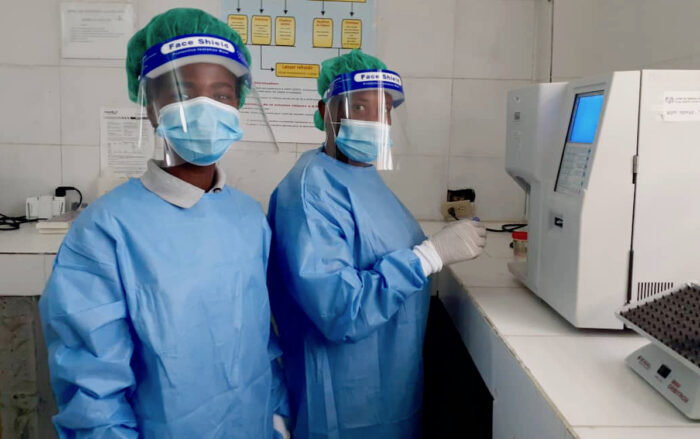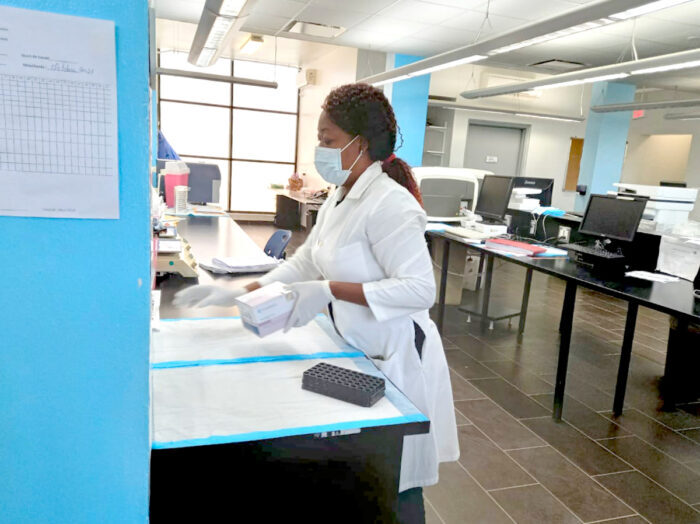Haiti is one of the poorest countries in the world and has faced many challenges in the last few years. In 2021 alone, an earthquake, political unrest, deadly violence, strikes, crime and kidnappings—not to mention the COVID-19 pandemic—have affected the population of more than 11 million people and put even more strain on the healthcare system.
In the midst of these challenges, Haiti’s National Public Health Laboratory System embarked on a new project—supported by the Elizabeth Glaser Pediatric AIDS Foundation (EGPAF) and Project ECHO at the University of New Mexico: to connect laboratories around Haiti for a virtual training and mentoring program using the ECHO model of case-based learning and guided practice.
At the launch of the project, Haiti was experiencing intense political instability, which culminated in the assassination of the Haitian president, sending the country into chaos.

“Haiti was a challenge in itself because of the political environment when we started; we had a lot of doubts and fears,” explains Konan Assouman Alphonse, an ECHO consultant based in Côte d’Ivoire where he worked with the HIV and laboratory ECHO programs since 2017.
With his experience supporting ECHO programs and as a fellow French speaker, Konan could easily relate to the Haitian ECHO team that he started mentoring. Konan worked with the team on all the steps necessary to rollout this ECHO program, including site assessments, equipment purchases, and installation. He also familiarized lab staff and clinicians with the program and trained them on how to attend the sessions via Zoom. Site visits had to be carefully scheduled with the safety of the staff in mind, given concerns around COVID-19 and the ongoing tumultuous situation in country.
This initiative is vital insofar as the question of continuing education remains ambiguous in Haiti—and even more so in the current situation in the country. Elsaïda Madeus, technician, Hôpital Albert Schweitzer.
At the beginning of 2021, Hamel Edet was hired as the national coordinator for the Haiti ECHO program. The program launched on June 10—after many Zoom calls between Konan and Hamel and planning calls with the EGPAF team, the ECHO Institute, and staff from the U.S. Centers for Disease Control and Prevention (CDC) in Atlanta and in Port-au-Prince.
Since, there have been sessions weekly connecting about 150 laboratorians from across Haiti. In a typical session, a practitioner presents a real case study on which they request advice. For example, one laboratory technician recently talked about a case that stumped his lab: a client living with HIV who had an undetectable viral load for years suddenly saw a spike, even though the client had reported no medication or lifestyle changes. A few weeks later their confirmation tests showed that the client was undetectable again.
The other professionals from across the country brainstormed possible explanations. One lab tech explained how delays in transport may lead to a compromised sample, while a physician described medical anomalies that could explain the unusual test results. The practitioner was able to go back to their site to follow up on ideas brought up in the discussion to identify the cause and adjust lab procedures—improving the quality of care moving forward.
“This initiative is vital insofar as the question of continuing education remains ambiguous in Haiti—and even more so in the current situation in the country,” says Elsaïda Madeus, a technician at Hôpital Albert Schweitzer. “We made contact with fellow professionals working in the health field, which allowed us to discuss concerns related to relevant cases. This greatly contributes to the strengthening of our professional capacities.”
“These listening and discussion sessions are a collective tool for sharing knowledge, experience and acting collaboratively,” Edet explained. “Now if a similar case appears in another site, that site will also know how to manage it. These learning [sessions] help identify solutions found by the group.”
A Global Model for Local Solutions
The ECHO model is centered on creating greater accessibility to knowledge and expertise by unifying a community of practitioners who can mentor and support one another to better serve their communities and goals. The project started in 2003 at the University of New Mexico to address gaps in healthcare in that largely rural state.
The success of the ECHO model was profound. Through videoconferencing sessions, a community of practitioners across the state were able to connect with one another, ask for advice, discuss challenging cases, and strengthen expertise—all without having to take time off to attend conferences or find the funds for travel.

“It then also became clear that this model wasn’t necessarily limited to this specialty,” says Jutta Lehmer, Sr Program Manager at the ECHO Institute at the University of New Mexico. “Education is now a very strong arm. We also saw that it could be used for more general health system strengthening, like laboratory work and global health security. We became involved with the Africa CDC, and the African Society for Laboratory Medicine and explored the use of ECHO for quality improvement and problem-solving system issues.”
In 2021 the ECHO model is used by 684 partner organizations with learners in 179 countries. The Elizabeth Glaser Pediatric AIDS Foundation supported the launch of the very first program in Africa, the HIV ECHO in Namibia in 2015 run by the Ministry of Health and Social Services and is still active in its 7th year after implementation. Then EGPAF became the implementing partner for the first Francophone ECHO in Africa, another HIV ECHO in Côte d’Ivoire.
ECHO in Côte d’Ivoire
As most ECHO practitioners will tell you, the strength of the ECHO model is not the technology, but rather the people who invest in the platform and the rich community they build. EGPAF was blessed to find the perfect person to lead this project in Côte d’Ivoire: Konan Assouman Alphonse.
“I was fortunate to be managing an e-learning and pedagogy project in Côte d’Ivoire, but I abandoned everything to join ECHO,” says Alphonse.
Alphonse believed that the ECHO model could be transformative, but he faced some pushback from those with less experience with e-learning.

“There were a lot of people who didn’t believe in it, especially with regards to the engagement level in new information and communication technology, such as Zoom and other online communication apps,” says Alphonse. This was in 2016, long before the COVID pandemic forced industries worldwide to adapt to remote learning and working in 2020. “There was a lot of doubt, as training had always been done face-to-face,” Alphonse says. But despite obstacles, as the project pushed forward, the results spoke for themselves.
“Practitioners found themselves feeling less isolated,” says Alphonse. “Sites were located throughout the territory, with some sites being almost 600 kilometers from the capital, where most of the trainings took place. Through the ECHO model, practitioners themselves began to form an online community that would regularly attend sessions, and they noticed that as their peer support grew, so did their knowledge.”
Through word-of-mouth the project grew from six participating sites to 28 and succeeded in training 3,000 practitioners in just two weeks, all without the cost and disruption of travel. “Results have shown that the implementation was absolutely fantastic, and the CDC encouraged EGPAF to continue this training,” Alphonse says.
When the COVID-19 epidemic struck, the Ministry of Health turned to the ECHO project to combat misinformation and to train health care workers in the response to the pandemic as restrictions on movement and indoor gatherings were enforced.
“In just two months 10,000 practitioners were trained in 900 health centers across the country. This is absolutely incredible,” Alphonse shared. “I never thought this was possible.”
Bringing ECHO to Haiti
“Alphonse introduced us to the ECHO model,” says Edet, from his office in Port au Prince, Haiti, “and we are able to use his experiences to implement it in my country. The ECHO program is quite similar- what goes on in Côte d’Ivoire is not very different from what is going on in Haiti—there are a lot of similarities. It was easy to understand and to use his mentorship.”

ECHO in Haiti was specifically designed to respond to laboratory challenges facing the country. Edet listed the top concerns as continuous training and reinforcement of professional development throughout one’s career, lack of equipment to run tests, and finally, the lack of standardized training, as there are several schools that maintain different standards.
Alphonse describes the gaps in mentorship and standardized training as part of a bigger issue of inequity. “We noticed tremendous disparities. When practitioners finished their training, there was no possibility to reinforce capacity and there were variations in the mentorship, as some parts of the country received support and other parts of the country received nothing.”
This project aims to break this cycle. Instead of bringing foreign experience to advise on Haitian health challenges in only select regions, the ECHO model provides a scalable framework for Haitian expertise to be shared among Haitian practitioners across the country.
Through the ECHO project, EGPAF secured equipment to conduct virtual sessions and improve lab monitoring resources. Now the staff from the National Laboratory can disseminate standardized quality assurance protocols, with these methods being reinforced with peer learning through the ECHO sessions.
While there were many similarities between Côte d’Ivoire and Haiti, such as remote sites and a need for training medical staff, Haiti also faces many unique difficulties. Konan had his doubts about implementation among all the challenges Haiti was facing.
“I asked myself ‘Is this possible? Will this work in Haiti? And the answer is yes—because it’s not based on the political situation. The technology is here: We have the Internet and the equipment. The rest is about building a community.”
The Strength of Community
This task, to build community, is Edet’s primary goal, and he is fully committed. He knows that the need for peer support and capacity building is needed even more in moments of crises. Through the political instability, localized crime and violence, and the recent earthquake, only two sessions were cancelled.
“No one wants to miss the session,” Edet says. “They write to me to make sure that the session will happen every Thursday, because they know that there’s something important going on. While our sessions target lab technicians, the word spread, and there is such enthusiasm that we have clinicians joining. We are seeing other departments and institutions are benefiting from this training. People are thirsty for professional development and for connections with their peers. This project was really needed.”
“Edet has really embraced his role in creating a very welcoming environment and that sense of community of practice,” says Lehmer. “They have a WhatsApp group for practitioners to connect during and between the sessions and it’s just heartwarming to see all the appreciative comments. Edet is truly a wonderful facilitator. He makes everyone feel acknowledged and appreciated. You can really tell that people feel connected and enjoy coming to these sessions.”

“The community of practitioners are very happy to be a part of this,” Edet says. “They tell me that they feel less isolated, and this is the ideal context for learning, reinforcing knowledge, finding collective solutions, and connecting with one another.”
“It is working so well that I wish Haiti had adopted ECHO even earlier,” Edet says. “It had been so difficult at times for our practitioners to have access to mentoring or to send staff to the capital for training. We are seeing such positive changes here. I really do hope that those countries who do not have a community of practice like this yet will consider adopting it.”
“I am very proud to be the coordinator of the lab project,” says Edet.




